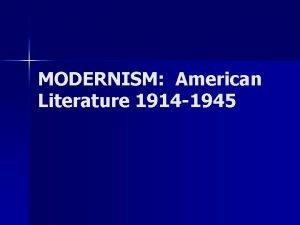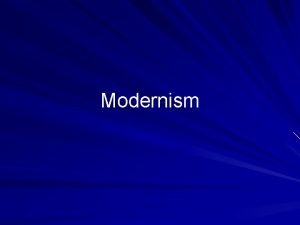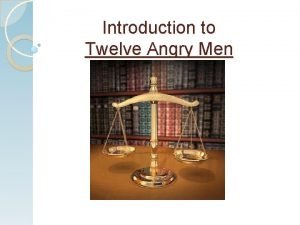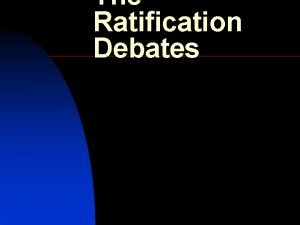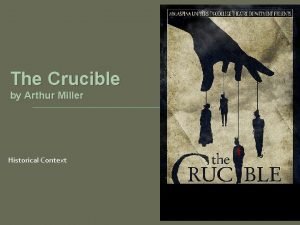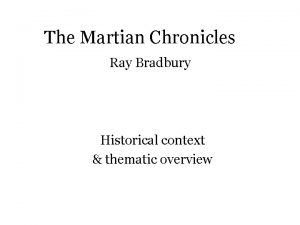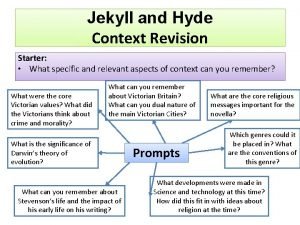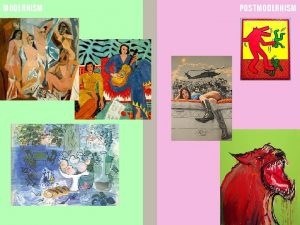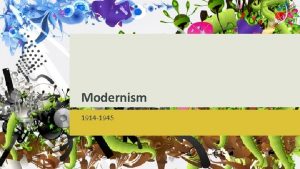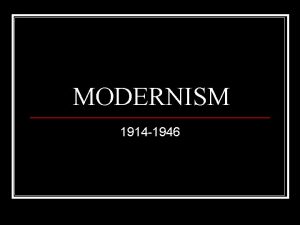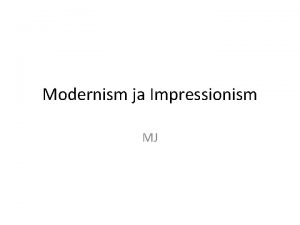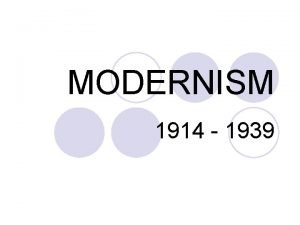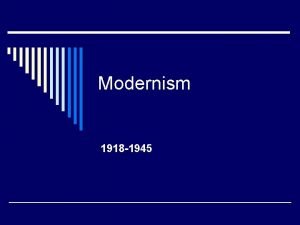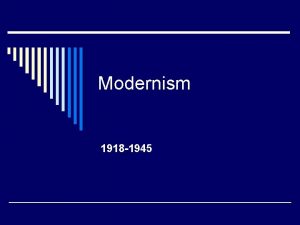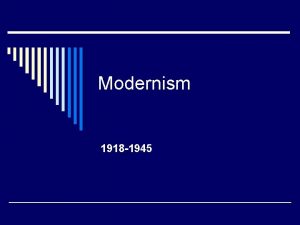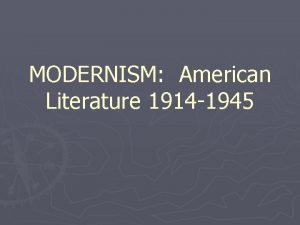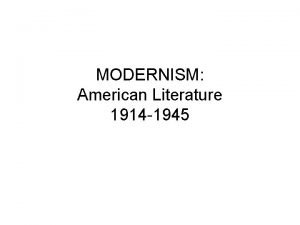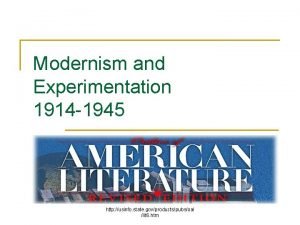Modernism 1914 1945 Historical Context of Modernism n















- Slides: 15

Modernism 1914 - 1945

Historical Context of Modernism n WWI (1914 -1917) n Women’s Suffrage (1919) n Great Depression (1929 -1942)

Historical Context of Modernism (cont. ) n Russian Revolution (1917) n n Introduction of Marxism and focus on the working class Freud and psychoanalysis (1920 s and 1930 s)

Characteristics of the Modern Era n A profound loss of innocence—loss of the American dream civilization was a "vast edifice of sham, and the war, instead of its crumbling, was its fullest and most ultimate expression. " Shocked and permanently changed, Americans returned to their homeland but could never regain their innocence” (Dos Passos, Three Soldiers. 1921) n n Emphasis on experimentation, mirroring fractured society Rejection of traditional forms and themes n Old traditions seen as “spiritually empty” Picasso Literature and Language Arts

Characteristics of the Modern Era (cont. ) n Rejection of artificiality and sentimentality n Favors the flawed, disillusioned hero who still manages “grace under pressure” –Hemingway n Interest in the subconscious n Stream of Consciousness as a narrative form

Brief sample of stream of consciousness Virginia Woolf's Mrs. Dalloway (1925) n It seemed to her as she drank the sweet stuff that she was opening long windows, stepping out into some garden. But where? The clock was striking--one, two, three: how sensible the sound was; compared with all this thumping; like Septimus himself. She was falling asleep. n

From Joyce’s Ulysses (stream of consciousness) n Yes because he never did a thing like that before as ask to get his breakfast in bed with a couple of eggs since the City Arms hotel when he used to be pretending to be laid up with a sick voice doing his highness to make himself interesting for that old [. . . ]Mrs Riordan that he thought he had a great leg of and she never left us a farthing all for masses for herself and her soul greatest miser ever was actually afraid to lay out for her methylated spirit telling me all her ailments she had too much old chat in her about politics and earthquakes and the end of the world let us have a bit of fun first God help the world if all the women were her sort down on bathingsuits and lownecks of course nobody wanted her to wear them I suppose she was pious because no man would look at her twice I hope Ill never be like her a wonder she didnt want us to cover our faces but she was a well educated woman certainly and her gabby talk about Mr Riordan here and Mr Riordan there

What were the “old traditions” that Modernism rejected? America as the land of promise (esp. thanks to the “machine. ”) n Continual progress leads to continued opportunity and a continued improvement of life n The determined individual will triumph— everything is possible. n

Notable Modernists T. S. Eliot (poet) Robert Frost (poet) • "The Love Song of J. Alfred Prufrock" • “Stopping By Woods on a Snowy Evening” • The Sacred Wood • “After Apple Picking” • The Waste Land • “Two Roads” • “Gerontion” • “Mending Wall” • “The Hollow Men” • Ash Wednesday (Photo courtesy Acme Photos) (© AP Images) F. Scott Fitzgerald Ezra Pound (poet) • This Side of Paradise (an “imagist) • The Great Gatsby • Des Imagistes (A compilation) • Tender is the Night • The Cantos • The Beautiful and the Damned • “In a Station of the Metro” (Photo courtesy Culver Pictures, Inc. )

Modernists continued Ernest Hemingway William Faulkner • The Sun Also Rises • The Sound and the Fury • The Old Man and the Sea • As I Lay Dying • A Farewell to Arms • Absolom, Absolom! • For Whom the Bell Tolls (Photo courtesy Pix Publishing, Inc. ) • Light in August (© AP Images) Zora Neale Hurston Eugene O’Neill (playwright) • Mules and Men • Desire Under the Elms • Tell My Horse • The Great God Brown • Their Eyes Were Watching God • Strange Interlude • Dust Tracks on a Road • Mourning Becomes Electra • Long Day’s Journey into Night (Photo © Carl Van Vechten, courtesy Yale University) (© AP Images)

Movements within Modernism n Symbolism n n Imagism n n Tried to portray the emotional effects of objects Discarded “overused” symbols Stressed a trust in the nonrational Concentration on precise image/word Imagery alone could carry emotion of poem Old-school structures and patterns not necessary Free Verse n Poetry without regular rhyming and/or metrical patterns

Sample of imagism In a Station of the Metro The apparition of these faces in the crowd; Petals on a wet, black bough --Ezra Pound

Another sample of imagism The Red Wheelbarrow so much depends upon a red wheel barrow glazed with rain water beside the white chickens --William Carlos Williams

Modern Art

Modern Art (cont. )
 Modernism vs realism
Modernism vs realism Modernism historical context
Modernism historical context The scarlet letter timeline
The scarlet letter timeline Historical context of night by elie wiesel
Historical context of night by elie wiesel 12 angry men historical context
12 angry men historical context Outsiders background
Outsiders background Historical context communication
Historical context communication Apush hippo
Apush hippo Historical context of federalist #10
Historical context of federalist #10 Who wrote 1984
Who wrote 1984 The crucible historical context
The crucible historical context Ray bradbury context
Ray bradbury context Hamlet history background
Hamlet history background Bob and wheel
Bob and wheel Context of jekyll and hyde
Context of jekyll and hyde Context of lord of the flies
Context of lord of the flies
